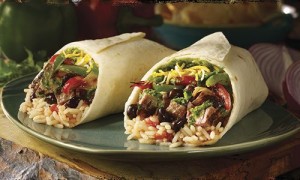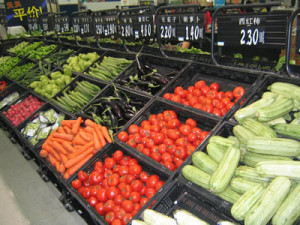If Walmart can figure out that raw sprouts are too risky to sell in their stores, why are fancy food service providers, like Emirates airlines still serving sprouts?
Rebekah Denn of the Seattle Times reports Walmart U.S. quietly stopped selling raw sprouts in October of 2010.
"This decision was made because of our commitment to our customers’ safety as well as our knowing of the inherent microbial risks associated with sprouts," said spokeswoman Dianna Gee. "Over the past year, we have been working with sprout growers within the industry to research .jpg) enhanced food safety controls and microbial intervention strategies that would result in safer sprouts, before re-introducing them for sale in our stores and clubs."
enhanced food safety controls and microbial intervention strategies that would result in safer sprouts, before re-introducing them for sale in our stores and clubs."
Don’t look to Macpherson’s Produce on Beacon Hill either, which pulled the health food after an E. coli outbreak linked to sprouts sickened thousands and killed 53 people in Europe and a salmonella outbreak linked to Northwest sprouts sickened 21 people last summer, including some in our state. The crunchy garnish is slipping off the menu at other outlets nationwide, says NPR.
I checked in with one of my favorite food-safety sources, Professor Doug Powell of Kansas State University, who brings blunt talk and scientific rigor to outbreaks and scares. He mentioned to me that sprouts were no longer available at Walmart, the first I’d heard of that move — and noted that plenty of others have taken that route. They’re one of the few foods he won’t touch himself.
"They are a hazardous food, and a lot of food service companies stopped serving them years ago…" Powell said.
"The industry is working on it, and my hat goes off to them, but…any industry is only as good as its worst producer."
So. How to decide if you want to eat them yourself, and how to do it safely?
As Dr. Raj Mody, an epidemiologist for the Centers for Disease Control, puts it in an online article, some people think of sprouts as the ultimate healthy food. But Mody also calls them "a perfect vehicle for pathogens," and suggests cooking them if you’re going to eat them at all.
The big problem. The seeds themselves can be contaminated, and they’re sprouted in a wet, warm medium that’s perfect for spreading contamination no matter where it originated.
Sometimes when we write about food safety, producers of the affected products can come off as extremely defensive, sure that their food cannot be at fault. But talking with Bob Sanderson, president of the International Sprout Growers Association, I found a guy who is both proud of .jpg) what he grows and very concerned about finding ways to make sure it’s safe industry-wide. The association started as a way to promote the nutritional value of sprouts, he said, but food safety has become more of its focus.
what he grows and very concerned about finding ways to make sure it’s safe industry-wide. The association started as a way to promote the nutritional value of sprouts, he said, but food safety has become more of its focus.
"(The sprout) has never been a big item in the produce world, and it’s always had a very dedicated customer base. But there have been a number of outbreaks, and they’ve caused a lot of concern. The best way to try to rebuld confidence in the product is to standardize the best practices for minimizing that kind of situation," he said.
The association is working with the FDA and, in particular, with the Institute for Food Safety and Health, figuring out the best practices to follow. A current project is designing an audit for sprout production, looking at all the most critical areas. Some of the bigger companies are doing their own research as well, he noted.
For sprouts to return to Walmart, for instance, Sanderson said the rigorous list of requirements growers are working on includes items such as having the growers show documentation on their seed sourcing and sanitizing, showing that they have tested their spent irrigation water, undergoing this "extremely detailed third-party audit…it covers absolutely everything", and being able to trace any problem sources.
"A lot of these things the industry for the most part is already doing," he said. There are not a lot of seed suppliers, but "the main ones are certainly doing a lot of testing and they won’t accept a seed lot if anything comes up in their tests," he said. That said, it’s not a complete guarantee, and they would like to see better sanitizing treatments for seeds than the chlorine-based one the U.S. Food and Drug Administration recommended years back. Testing the spent irrigation water is is something that he thinks almost all the commercial growers are doing. "It’s been designed so you’ll get the results back before the product goes out the door," he said.
A table of sprout-related outbreaks is available at http://bites.ksu.edu/sprouts-associated-outbreaks.
 The email said Eurest, the third-party company in charge of managing the kitchen, will hire a quality assurance manager and will retrain staff on the company’s safety protocols.
The email said Eurest, the third-party company in charge of managing the kitchen, will hire a quality assurance manager and will retrain staff on the company’s safety protocols.







.jpg) enhanced food safety controls and microbial intervention strategies that would result in safer sprouts, before re-introducing them for sale in our stores and clubs."
enhanced food safety controls and microbial intervention strategies that would result in safer sprouts, before re-introducing them for sale in our stores and clubs.".jpg) what he grows and very concerned about finding ways to make sure it’s safe industry-wide. The association started as a way to promote the nutritional value of sprouts, he said, but food safety has become more of its focus.
what he grows and very concerned about finding ways to make sure it’s safe industry-wide. The association started as a way to promote the nutritional value of sprouts, he said, but food safety has become more of its focus..jpeg) of his Hardin County facility, defaulted on bank loans, been "blackballed" by food vendors and been barred from bidding on contracts with retailers.
of his Hardin County facility, defaulted on bank loans, been "blackballed" by food vendors and been barred from bidding on contracts with retailers. p.m. Shover then placed the opened packages back on the shelf to be sold and never paid for them, according to police.
p.m. Shover then placed the opened packages back on the shelf to be sold and never paid for them, according to police.